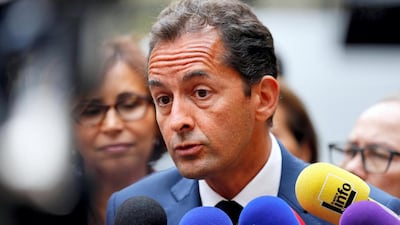As President Emmanuel Macron sets himself the challenge of reforming the relationship between the state and the country’s Muslims, a grassroots initiative has been launched in response to his vision of an “French Islam”.
The organisation launched this week by prominent intellectual Hakim El Karoui is part of a set of proposals from the Franco-Tunisian author to Mr Macron that aims to inspire Muslims unite to together in a new direction.
According to the banker turned author, the Muslim Association for a French Islam (AMIF) has the objective of fostering a “serene integration of Islam in France” and countering the discourse propagated by “salafists and the Muslim Brotherhood.”
By acting as a middle man between the government and the worshippers, AMIF intends to cast itself as a trusted interlocutor for both parties and hence promote transparency and accountability.
By offering a gateway for services for Muslim citizens, the organisation could bolster confidence within the wider society. "There are different aspects to this, for example the issue of the pilgrimage [to Mecca]," Mr El Karoui, who is senior fellow at the French think-tank Institut Montaigne, told The National. "It has to become compulsory for example that a travel agency offering the pilgrimage to obtain an authorisation by an organisation like AMIF. If this is unavoidable, then you have the chance to regulate the market and put an end to all unsuitable behaviours."
By vetting specialist agencies and enterprises that are devoted to aspects of Muslim life – from travel agencies to halal meat suppliers and Imams – Mr El Karoui said he believed an organisation like his would be able to improve transparency and channel the worshippers' donations and investments towards institutions that commit to transparency.
____________________
Read more:
French Muslims must resist Islamist extremists: Hakim El Karoui
Macron's vision for French Islam may present him with his biggest challenge yet
____________________
The French state remains heavily dependent on grassroots organisations like AMIF to come up with solutions to the problem of murky foreign funding and the extremist threat. Given its secular constitution, the state cannot regulate Muslim religious activities or build mosques or employ Imams to compete with foreign countries using these practices to expand their influence in the continent.
Mr Macron called for reform of Islam in France multiple times since becoming President in May 2017 and committed to giving Islam "a framework and rules" to discourage insular Muslim communities and combating extremist strands. A reform package was promised last year but put off until 2019 after encountering institutional resistance. Reports in the country’s media suggest it may include a proposal to amend the 1905 law separating church and state. The clear dividing line is a distinction cherished in the country’s secular republican tradition.
A number of French presidents have unsuccessfully tried to reform France’s relationship with Islam. Former President Nicolas Sarkozy tried, as interior minister, to establish a representative council for French Muslims. But divisions between Muslim groups from different countries sunk the initiative.
As Mr El Karoui himself admitted, the success of his proposal is hinged on the participation of the Muslim community and the adherence of Muslim organizations. “We don’t have a coercive power, we cannot be an mandatory conduit,” he said.
But similarly to universities who voluntary seek accreditation that attest the quality of their services, Mr El Karoui believes AMIF will push a broad front of Islamic organisations to develop “best practices” as well as promote the voices of that silent majority of Muslim believers who share an inclusive interpretation of Islam.
“Today we see some trying to spread the idea that there is only one interpretation of Islam, which is the political and reactionary one” he said. “[Countering this narrative] requires organisation and institutionalisation.”
AMIF is one of many similar initiatives calling for an umbrella organisation uniting the moderate factions. One survey by group that also seeks to make the voices of moderate Muslims heard, found that a large majority among the 24 thousand respondents to an online questionnaire is favourable to a national organisation leading and representing the Muslim community.
"The objective is to give voice to the Muslim community which is often silenced ether on the media by people who do not represent us, or by politicians who don't know anything about the realities of Muslim communities in this country, " Naziha Mayoufi, founding members of L.E.S. Musulmans, told The National.
Whether Mr Macron will concede official backing to any of these initiatives, however, is still unclear. It is also unclear if Mr El Karoui, who was an adviser to the regime of ousted Tunisian president Zine El Abidine Ben Ali can reach across political and social divides to rally the support he needs from the Muslim community.
Mr Macron – whose popularity has fallen since the beginning of a series of violent street protests in November – is preparing for the European Parliament election, where he faces his strongest challenge from conservative and hard-right groups urging or tougher policies to oversee Muslim clerics, mosques and schools. Embracing a grassroots initiative could be one way to silence those who criticise his inability to effectively address the roots of Islamic fundamentalism.

